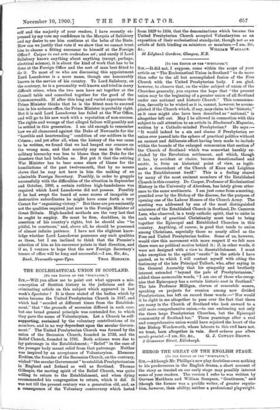[To THE EDITOR OP THE " SPECTATOR."] SIR,-It did not, I
suppose, come within the scope of your article on " The Ecclesiastical Union in Scotland " to do more than refer to the all but accomplished fusion of the Free Church with the United Presbyterian body. I am glad, however, to observe that, on the wider subject of union of the Churches generally, you express the hope that "the present union may be the beginning of a greater union of all Scotland under one national and historic Church." This consumma- tion, devoutly to be wished as it is, cannot, however, be accom- plished if the Church which, if any, may claim to be "historic," as it once might also have been described as " national," is altogether left out. May I be allowed in connection with this subject to call attention to an article in Blackwood's Magazine, written by a Catholic-minded Presbyterian ? He says :- " It would indeed be a sin and shame if Presbyterian re- union ever passed into the sphere of practical politics without an earnest and deliberate effort having been made to include within the bounds of the enlarged communion that section of the Church of Scotland which was somewhat harshly ex- cluded by the Revolution settlement, and which, though it has, by accident or choice, become denationalised and exotic, is, from an historical point of view, as legiti- mate a descendant of the Church of Knox and Leighton as the Establishment itself." This is a feeling shared by many of the most eminent members of the Established Church in this country. Dr. Cooper, Professor of Ecclesiastical History in the University of Aberdeen, has lately given utter- ance to the same sentiments. I am just come from a meeting, presided over by the Bishop of the diocese, for the purpose of opening one of the Labour Homes of the Church Army. The meeting was addressed by one of the most distinguished ministers of the Established Church in Scotland, Dr. Cameron Lees, who observed, in a truly catholic spirit, that to unite in such works of practical Christianity must tend to bring together the Episcopal and Established Churches in this country. Anything, of course, is good that tends to union among Christians, especially those so nearly allied as the Free and United Presbyterian bodies. Some of us, however, would view this movement with more respect if we felt sure there were no political motive behind it ; if, in other words, it were not designed with a view to disestablishment. I must take exception to the epithet " exotic " in the article I have quoted, as to which I will content myself with citing the testimony of the late Principal Tulloch, who, after saying in the General Assembly that his sympathy and brotherly interest extended " beyond the pale of Presbyterianism," added these memorable words, " I am one of those who recog- nise that Episcopacy has a certain historic root in Scotland." The late Professor Milligan, clarum et venerabile women, speaking on projects for reunion among now divided Presbyterians, has left on record these words :—" Nor would it be right in me altogether to pass over the fact that there are many in the Church of Scotland who look onward to a still more comprehensive union,—to one embracing not only the three large Presbyterian Churches, but the Episcopal community of Scotland too." These yearnings after a real and comprehensive union would have rejoiced the heart of the late Bishop Wordsworth, whose labours to this end have not, we trust, been altogether in vain. Serif arbores gum alters seculo prosint.—I am, Sir, &c., G. J. COWLEY-BROWN. 9 Grosvenor Street, Edinburgh.






































 Previous page
Previous page